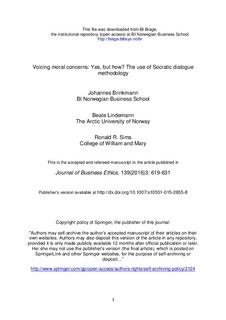| dc.contributor.author | Brinkmann, Johannes | |
| dc.contributor.author | Lindemann, Beate | |
| dc.contributor.author | Sims, Ronald R. | |
| dc.date.accessioned | 2016-12-07T09:51:51Z | |
| dc.date.available | 2016-12-07T09:51:51Z | |
| dc.date.issued | 2016 | |
| dc.identifier.citation | Journal of Business Ethics, 139(2016)3: 619-631 | nb_NO |
| dc.identifier.issn | 0167-4544 | |
| dc.identifier.issn | 1573-0697 | |
| dc.identifier.uri | http://hdl.handle.net/11250/2424483 | |
| dc.description | This is the accepted and refereed manuscript to the article | nb_NO |
| dc.description.abstract | After a selective review of relevant literature about teaching business ethics, this paper builds on a summary of Fred Bird’s thoughts about the voicing of moral concerns provided in his book about moral muteness (1996). Socratic dialogue methodology (in the tradition of L. Nelson and G. Heckmann) is then presented and the use of this methodology is examined, for business ethics teaching in general, and for addressing our paper topic in particular. Three short form Socratic dialogues about the paper topic are summarized for illustration, together with preparation and debriefing suggestions for a Socratic dialogue unit as part of a business ethics course. In conclusion, Socratic dialogue design is related to the experiential learning approach, and characterized by a few basic traits, which imply both risks and opportunities for business ethics teaching. | nb_NO |
| dc.language.iso | eng | nb_NO |
| dc.publisher | Springer | nb_NO |
| dc.title | Voicing moral concerns: Yes, but how? The use of Socratic dialogue methodology | nb_NO |
| dc.type | Journal article | nb_NO |
| dc.type | Peer reviewed | nb_NO |
| dc.source.journal | Journal of Business Ethics | nb_NO |
| dc.identifier.doi | http://dx.doi.org/10.1007/s10551-015-2655-8 | |
| dc.description.localcode | 1, Forfatterversjon | nb_NO |
